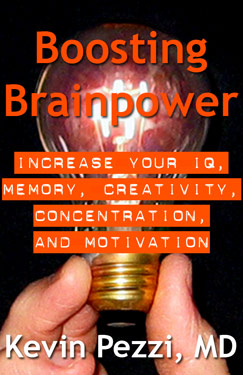Can a deaf person specialize in emergency medicine? Part 2 (Note: I recommend this topic for everyone interested in increasing intelligence and creativity.)
Q: Since I ardently want to become a physician in spite of my deafness, I am really striving to reach that goal. I am buying all of your books and following your advice such as reading The Memory Book, a medical dictionary, a standard dictionary, a wide variety of subjects, magazines, and so on. One problem, I am sad to say, is that English is my second language. My English is not that great. Do you have any ideas to improve your English skills like grammar, word choice, and writing? I would REALLY appreciate your advice. Thank you. You really rock my world, Dr. Pezzi.
Answer by Kevin Pezzi, MD: I grew up at a time in which English teachers adopted a "less is more" approach. They covered a few basics, such as pronouns and verbs, but never mentioned sentence structure, predicates, conjunctions, or many other topics that would have materially improved my comprehension of English and writing proficiency. The effect of this shaky foundation was compounded by the fact that I was, according to my sixth-grade teacher, "slow," perhaps a consequence of so much lead exposure during my childhood. At that time and for years afterward, I wasn't thinking of becoming a doctor, but a laborer, mowing lawns or working in an auto factory. In short, I was on the fast track to nowhere. If someone had told me that I would later graduate in the top 1% of my class in medical school, I might have laughed and asked him, "What have you been smoking?" It seemed ludicrously impossible.
Yet it happened. Furthermore, in addition to this academic transformation from dunce to doctor, I also experienced an even more pronounced upsurge in creativity. One of my physician bosses once told me that my IQ was 160 and that I was the smartest doctor he ever met, but there are plenty of people smarter than I am. My real forte is inventing and creativity, which manifested itself even in subjects that I am comparatively weak in, such as math and computer programming.
Most people do not have to contend with many of the things that hindered my intellectual development and education, such as the lead exposure, lackluster teaching, poverty, occasional hunger, and sleepless nights resulting from my father drinking booze and then beating my mother. I was also so blind that I couldn't see the blackboard, so I had no idea what my teachers wrote on it. Add in some more handicaps that I'd rather not mention, and it is not surprising why I was once on the fast track to nowhere. Nevertheless, in spite of those many disadvantages, in a few years I metamorphosed myself from a dunce to a genius. As I've mentioned before, if I can do it, almost everyone can do it. However, most students go through the usual educational mill that increases their knowledge without measurably augmenting their intelligence. So little attention is devoted to enhancing brainpower that it seems to be a tacit acknowledgement by educators that such a goal is a pipedream. I am living proof that it is not.
In my various books and web sites, I outlined some of the methods I used to transform my brain from a third-rate one to a mind that could beat privileged students from upscale families who seemingly had every advantage over me: naturally higher IQs, better teachers, stable family lives, nurturing parents, prep schools, tutors, and an absence of physical handicaps. In exam after exam in medical school, I beat people with Ph.D.s in subjects such as biochemistry and pharmacology that were new to me. I did that at a time in which my performance was still thwarted by suboptimal living conditions and a "ghetto sled" car that refused to move until its transmission had been warmed up for 30 to 45 minutes. Collectively, those and other problems wasted a few hours per day—time that otherwise could have been spent studying and learning even more. Again, if I could do it, you can, too.

Reading is important.
What you read is even more important.
You asked about improving English skills. One of the best ways to do that is simply to read avariciously. Skip the fluff that most people read and focus on more challenging subjects and, in general, anything written by smart people with a flair for logically concatenating ideas that superficially seem disparate. In my blog, for example, I discuss how a vestige of slavery in the United States should make every prospective ER doctor wonder if the freedom we're promised is truly as all-encompassing as it may seem (here's a link to that specific discussion). I integrate other information in my books, such as showing the relevance of chemistry and physics to sexual pleasure in The Science of Sex. A reader sent the following comments to me after purchasing my first book:
"I'm speechless. Well, as speechless as I get. ;-) Fascinating Health Secrets is simply a fantastic book. I can't begin to tell you what a pleasure it is to read—my brain gets such a great workout it feels like drinking 5 cups of coffee. Rarely do I find something so mentally stimulating that I can actually feel my IQ rising as I read it. Apart from the health tips themselves, there is so much killer material in the book. From your forays into discussing medical insurance and healthcare, to the observation that it is exceptional individuals who drive society and technology forward, I found myself laughing out loud, and nodding in total agreement. Please accept a virtual handshake and hearty slap on the back for such a wonderful piece of work."
The person who sent that, I later discovered, is a very intelligent man with a computer science degree and an avid interest in reading and health. If he could feel his IQ rising as he read it, others could, too—especially people who are less intelligent and hence with more room for improvement.
After reading Fascinating Health Secrets, David Hacker, a professional reviewer for Prime Time News & Observer, wrote:
"There's an odd fascination with the way Pezzi's mind works. He is a scholar, bright (possibly brilliant), and single-minded. There's plenty of useful information . . . some interesting tidbits . . . life-saving tips . . . and amusing historic trivia. For the most part, you can take this book seriously. At the same time, you can have fun with its folksy, whimsical and chatty style."

Use Dr. Pezzi's MySpamSponge service. It:
![]() "soaks up" your spam so spammers can't bug you
"soaks up" your spam so spammers can't bug you
![]() helps protect your privacy
helps protect your privacy
![]() gives you a new way to communicate via the Net
gives you a new way to communicate via the Net
![]() makes Internet dating free &
makes Internet dating free &
gives you new ways to meet offline, too!
Incidentally, I sometimes incorporate historic trivia not for its entertainment value, but to make a point. For example, if you've read all of my blog postings, the endless scandals about contaminated products from China will seem even more alarming if you consider them in the context of the World War 2 "trivia" I presented. Now to the relevant crux of what Mr. Hacker wrote: "There's an odd fascination with the way Pezzi's mind works."
Indeed. That is precisely why I think reading my books and web sites is valuable. I discuss topics that many people have never previously considered, and I present them in a way that should really make you think. With sufficient exposure to these new insights, in the future you and others won't look at the world in the same light. You will begin thinking more deeply and challenging basic assumptions that "everyone knows are true." In the process, you will become more intelligent and creative. However, reading my writings is just a small part of what you must do. I've outlined other requisite steps elsewhere in my books and web sites.
I realize that most people are too busy bopping through life with iPods glued to their ears to devote the time it will take to improve their intellect to the point that they could go from dunce to doctor, but this permutation in brainpower is not a quantal thing; that is, it is not all or nothing. Devote some time to it in the way I suggest, and you will become smarter.
Frankly, considering the potential payoff, I am amazed that corporations don't seize this opportunity to boost their profits by making their workers smarter, more creative, and more productive. Some of my tips for achieving those effects can be realized in less than an hour, not years, so the payoff is not some distant reward that benefits only a few highly motivated individuals.
Back to the main Question & Answer page


